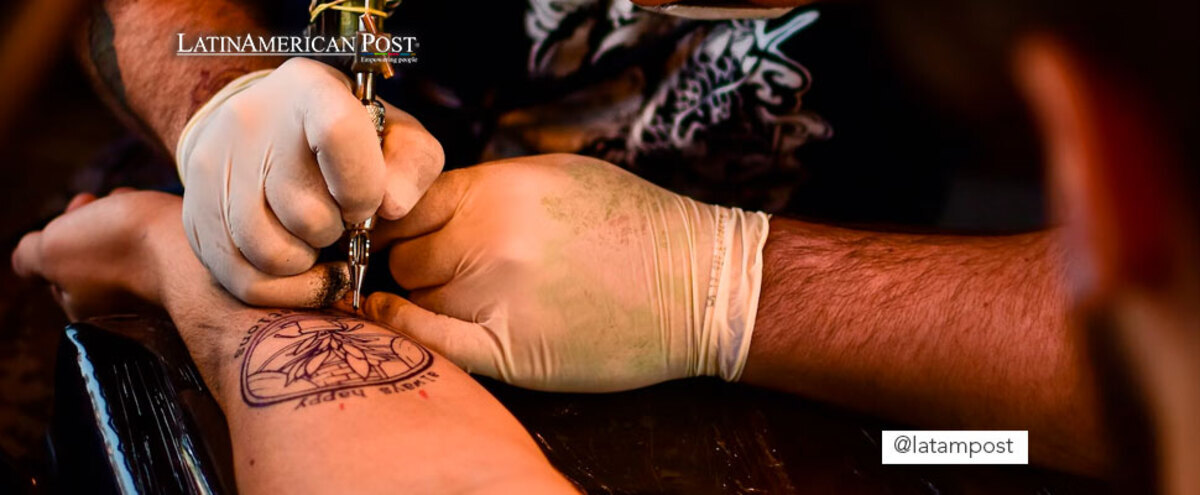How to Take Care of the Skin after Getting Tattoos?
After Tattooing, it is Necessary to Have a Series of Skin Care that Guarantee Good Healing and that the Tattoo Lasts in Good Condition. In Latinamerican Post we Compile a Series of Recommendations.

Photo: Unsplash
LatinAmerican Post | Daniel Alejandro Vergara
Escucha este artículo
Leer en español: ¿Cómo cuidar de la piel luego de hacerse tatuajes?
A tattoo is a form of body modification in which inks and pigments are applied to the dermis (second layer of the skin, after the epidermis) using needles or other instruments. Various cultures in the world have made tattoos on their people for thousands of years, many of these functioned as a symbol of power, protection or faith.
Although it is historically proven that it is an ancient art, tattoos have not always been well seen by society. Towards the end of the 18th century, in the West, tattoos were only popular among sailors and people who had prison sentences. In the American continent, it was not until 1870 that the first tattoo studio was created in New York. Subsequently, the rise of the tattoo takes a pause and is resumed in 1960 with the "hippies". After 1960, the tattoo begins to acquire another meaning until the popularity it has today. According to a study by the German firm Dalia Research, about 38% of the world's population has a tattoo.
Now, if you have a tattoo or plan to get one, it is essential to know what care you should have. Although a tattoo is something that can be done in a matter of minutes or hours, you have modified your skin with pigments and have generated skin wounds that must be cared for and attended to in the best possible way. That is why below we inform you of some basic care before and after a tattoo.
Before:
-
A cheap tattoo can be more expensive than it seems, it is better to spend a little more, but with the certainty that it will be done in a place certified by the competent health entities in your country.
-
Check what style of tattoo you want and what professional can do it. As in all art, there are tattoo artists specialized in certain styles.
-
Keep in mind that in the study they use certified inks and endorsed by the competent entities.
-
Think about the colors you want to use for the tattoo, according to the Spanish Academy of Dermatology and Venereology, red ink is the one that can cause the most abnormal reactions on your skin.
-
Avoid drugs, alcohol, or caffeine 24 hours before getting a tattoo.
After:
This is the most important point, not only to avoid dermatological problems, but also to maintain the quality of the tattoo. For Neftalí Ordóñez, a tattoo artist with more than 17 years of experience and creator of the Embera Tattoo workshop studio, the most important thing is to follow the professional's instructions: "Mainly, it is always recommended that you wash the area very well with neutral soap, dry it carefully with paper giving small blows (it should not be rubbed). It is necessary to apply a thin layer of moisturizing cream 2 or 3 times a day."
We recommend you read: This Is How Music Can Improve Your Quality Of Life
Can the care change depending on the place of the tattoo?
Ordoñez affirms that care can change substantially if the tattoos are in areas with folds (such as the elbows or knees), if they are in areas of "difficult access" (such as behind the ears), or if they are in parts of the body that can sweat regularly (like feet). For these areas it is essential to be more rigorous with cleaning and care.
Can the care vary depending on the style or the colors that are applied?
“Currently, when a job takes many hours and has required a lot of ink, such as 'blackout', some tattoo artists are recommending a dry healing technique, that is, with less cream than normal. The results of this technique are optimal, but it will always depend on the professional's recommendations, since he is the one who knows how much ink was used and what type of 'damage' could be done to the skin,” Ordóñez said.
Other recommendations to keep in mind:
-
Normally, after finishing, the professional will clean the area that was worked on, apply a moisturizer and cover the tattoo with plastic to protect it. This plastic should typically be kept for the first 24 hours (if possible).
-
Avoid touching the tattoo with dirty hands.
-
Avoid wearing tight-fitting clothing that can cause friction with the skin. This can lead to infections or slow down the healing process.
-
Do not consume alcohol the first and second day after tattooing. Both alcohol and certain types of irritating foods can cause inflammation or unwanted skin reactions.
-
Constantly hydrate. According to the American Academy Dermatology Association (AAD), keeping the skin hydrated is essential for faster tattoo healing and color retention. Likewise, this institution recommends not moisturizing the skin with petroleum or Vaseline-based products because in some cases it can fade the ink. Remember not only to moisturize the skin with creams, but also to drink water daily.
-
Protect it from the sun and keep it away from tanning beds and sunlamps. According to US Dermatology Partners, although a tattoo needs sun and fresh air after the first few months, it is necessary that every time you wear your uncovered tattoo you apply sunscreen with a minimum SPF of 30. During the first months, protecting it from the sun is important to avoid ink fading and skin irritations. Likewise, the use of tanning beds or sunlamps is not recommended.
-
Avoid using cosmetics on the tattoo area.
-
Consult a dermatologist if your skin develops an allergic reaction or you notice any significant changes in the tattoo.




